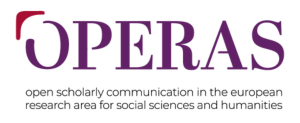The COESO project (Collaborative Engagement on Societal Issues) ran from January 2021 through December 2023. It was funded by the European Commission through a Science with and for Society grant and led by the OPERAS research infrastructure. It served as a meeting point between various European communities representing social sciences and humanities, citizen science, and open scholarly communication. Its goal was to contribute to overcoming the obstacles that hinder the development of citizen science in the social sciences and humanities and facilitate and support participatory research through a number of actions, most prominently, the development of VERA (Virtual Ecosystem for Research Activation), a hub for collaborative knowledge production and sharing. Additionally, COESO engaged research funding organisations to enhance financial support to citizen science. As a bridging endeavour, COESO worked together with existing communities such as Hypotheses.org and EU-Citizen.Science. Moreover, it facilitated mutual learning exercises among practitioners to explore the frontiers of innovation in the social sciences and humanities’ public engagement. Furthermore, to measure the quality of collaboration between researchers and citizens, COESO developed a proof of concept for a potential tool called “cooperation analytics.”
At the heart of the project were ten citizen science pilots, representing a variety of social sciences and humanities disciplines, societal challenges and types of engagement with citizens in different European countries. The pilots addressed specific societal issues: mass tourism, education and gender, resilient societies, fight against crime, societal changes, migration, inclusive city planning, societal inclusion of ageing people, clean water accessibility, climate change awareness, and children’s access to nutrition. Information about each of the pilots, including links to their individual blogs can be found here.
COESO project partners:
- Bulle media
- CADMIUM compagnie
- Cafébabel
- Centre national des la recherche scientifique (CNRS)
- Centro em Rede de Investigação em Antropologia (CRIA)
- Crime & Tech (C&T)
- École des hautes études en sciences sociales (EHESS)
- Fondation nationale des sciences politiques (Sciences Po)
- Ibercivis
- Investigative Reporting Project Italy (IRPI)
- Max Weber Stiftung – Deutsche Geisteswissenschaftliche Institute im Ausland (MWS)
- Net7
- Réseau français des instituts d’études avancées (RFIEA)
- Université Polytechnique Hauts-de-France (UPHF)
- Zero – Associação Sistema Terrestre Sustentável
COESO work packages:
- WP1–Project Coordination and Management
- WP2–Pilots implementation and Open Call
- WP3–Development of the Virtual Ecosystem for Research Activation (VERA)
- WP4–Funding Citizen Science
- WP5–Cooperation quality assessment
- WP6–Enhancing Public Engagement in Citizen Science through transmedia writing and mutual learning
- WP7–Communication and Dissemination
COESO’s Key Results
COESO produced a number of publicly available reports about every aspect of the project. The following “key results” were determined by the project partners to be the most relevant and reusable. More information about them can be found within the “Plan for the Exploitation and Dissemination of Results” or click on the links provided here to explore.
VERA hub: The VERA hub is a website, fully developed within the COESO project, that is intended to support participatory research and citizen science in the social sciences and humanities by providing a virtual space for various project stakeholders to find each other, to find useful collaboration tools for building their projects together, and to provide a convenient search function for finding relevant funding calls for projects.
Mutual Learning Exercises: Several different formats of Mutual Learning Exercises (MLEs) were explored within the COESO project, where diverse stakeholders from multiple projects were brought together, in-person and on-line, to learn from each other. These MLE formats were successful in facilitating knowledge exchange and are reusable in other contexts.
Cooperation Analytics: COESO developed the concept and technical code for a potential tool called “Cooperation Analytics”, which can be used to analyze and self-assess the cooperation aspect of collaborative project members. Through natural language processing, the tool uses a set of 23 indicators to analyze texts it is given. The code is available at https://github.com/yuma-ando/COESO_Cooperation_Analytics.
Funding Advocacy: COESO’s funding advocacy work was multifaceted, but at its core was the facilitation of workshops for funders, designed to promote knowledge sharing on best practices for funding citizen science in the social sciences and humanities. The funding advocacy KER refers to a service that includes the organization of more funder workshops, utilizing and expanding upon the workshop format that was developed and used within the COESO project. It includes a list of funders interested in collaboratively shaping new schemes to support participatory research in the SSH.
Podcast and Articles: Open Call Guidelines: COESO’s second set of pilot projects were funded through a “cascade funding scheme,” whereby COESO re-assigned a designated portion of its Horizon 2020 funding to specific citizen science projects. This was accomplished through an Open Call for applications, with an Open Call Guidelines outlining all of the rules and procedures for the open call process. Designing the guidelines involved legal counsel as well as input and feedback from all the consortium partners, which is therefore a valuable resource for anyone who is designing an open call for funding.
For more further information on each of the results, follow the links in the image below (right click to open).
For further information check the COESO website, and please don’t hesitate to contact Alessia Smaniotto (alessia.smaniotto[a]openedition.org) and Pierre Mounier (pierre.mounier[a]openedition.org).
COESO News
This project receives funding from the European Union‘s Horizon 2020 research and innovation programme under grant agreement number 101006325.


